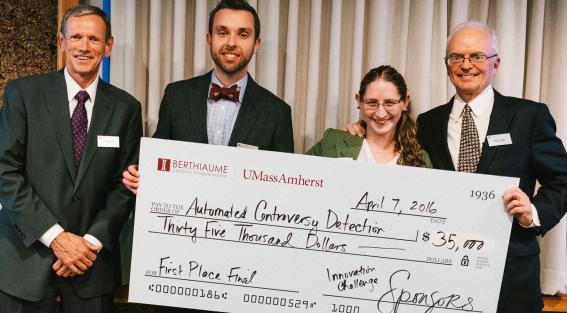Innovation Challenge Winners Offer Innovative, Marketable Ideas
April 19, 2016
Automated Controversy Detection, a startup business founded by UMass Amherst computer science 4th-year Ph.D. candidate Shiri Dori-Hacohen, earned top honors of $35,000 in seed money on April 7th at the campus’s 2016 Innovation Challenge business plan competition. Coordinated by the Berthiaume Center for Entrepreneurship, an Isenberg-based initiative that promotes entrepreneurship across the UMass Amherst campus, the multi-stage Challenge, in its culminating event of the year, featured six student teams that vied for $65,000 in awards.

Powered by sophisticated machine learning algorithms, Automated Controversy Detection’s service automatically earmarks controversial topics in political, healthcare, and other domains by comparing information against multiple Web resources, including Wikipedia. Dori-Hacohen develops algorithms with fellow researchers in UMass Amherst’s Center for Intelligent Information Retrieval. She and they have received support from the National Science Foundation and Google.
The service, she noted, will allow consumers, companies, and other organizations—including news organizations—to detect false information. That, she said, will help them to figure out whether they are seeing only one side of a story—furthering both accuracy and an organization’s management of its reputation. Automated Controversy Detection’s business strategy will deploy
a freemium model, offering the service free-of-charge to consumers and developers while extracting revenue from companies that track their PR, and through licensing deals with social media and news outlets.
Other Finalists Excel
Second-place honors and $20,000 in seed money went to GeneRisk, a software service that allows medical clinicians to detect neurodevelopmental disorders—notably, early indicators of autism. Medical professionals extract a patient’s saliva sample, which they send to a laboratory for gene sequencing and diagnosis. To date, diagnosis of such disorders has relied largely on questionnaires and trial-and-error treatment, despite advances in understanding complex genetic disorders, observed GeneRisk founder and Neuroscience and Behavior Ph.D. candidate Ajay Kumar.
The competition honored three other finalists. Glow (Abhishek Dwaraki, Ph.D. candidate in Electrical & Computer Engineering) marshals software defined networking to bring a Google Maps analog to networking. FSIA (Sydney Robinson undergraduate, McCormack Sport Management) aspires to bring insurance coverage to fantasy sports. And Lumme (Akshaya Shanmugam—Ph.D. candidate in Electrical and Computer Engineering and Abhinav Parate, alumnus), deploys sensors to detect individual smoking patterns and recommend interventions.
Judges as Educators
Each finalist presented a three-minute project description, followed by twelve minutes of probing questions from the competition’s six judges. The judges—venture investors, legal experts, and entrepreneurs themselves—offered a wealth of perspectives grounded in business reality. “What kind of company can you build around this service?” “Have you looked at analogous business models?” “What about customer privacy issues?” “How big is the market and how big will it be in three to five years?” “What are your manufacturing costs?” “Is your algorithm patentable?”
In their questions and advice, the judges excelled as enablers, critics, and educators, empowering the finalists and offering insights to them and their UMass audience.